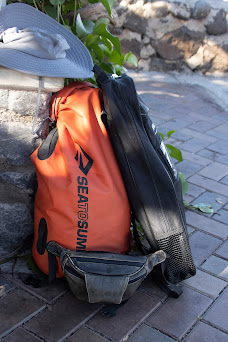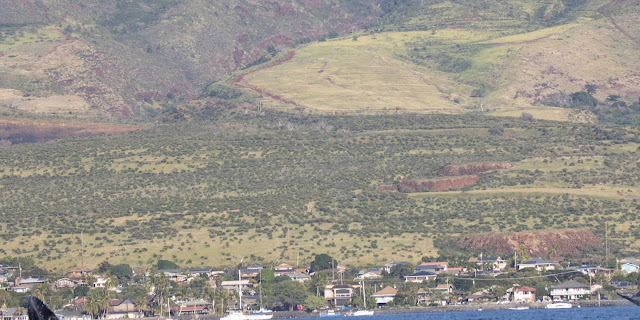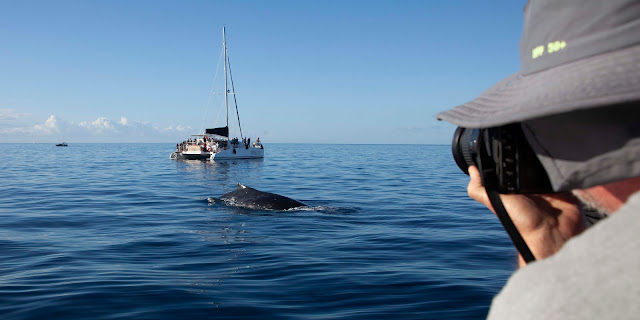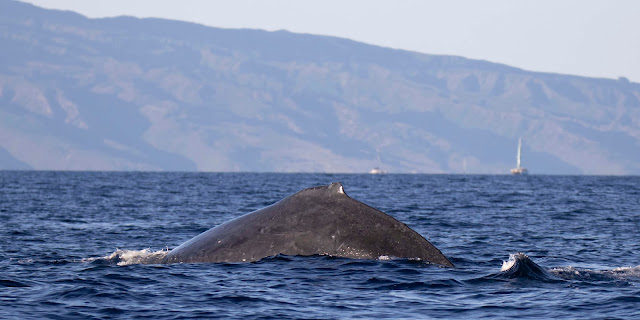Entanglement
Before I move on to our zodiac Whale watch, I need to cover an event we witnessed on the PacWhale Ultimate Whale Watch. We came upon several boats, including two commercial Whale watching boats, a zodiac and a small NOAA research boat, monitoring a female Humpback Whale that was entangled in fishing nets.
She was first spotted on two days earlier, I guess they hadn't been able to reach or keep track of her.
I saw the net, but failed to get a photo (it was one of those times that moving around the small boat was tough), but Scott got one.
When we saw it with our eyes, we couldn't figure out how the net was attached, but when I looked at my photos, I saw that she had a rope wrapped around her in front of her pectoral fins. It didn't seem to be inhibiting her movement, but being entangled can be fatal.
She had a calf with her, making the situation even more serious.
She was also accompanied by a male escort.
The NOAA boat deployed a drone and began photographing the Whale as they spoke with the disentanglement team.
 |
| Collecting valuable data |
When a boat encounters an entangled Whale, it must stay close and keep track of the Whale's movements until a disentanglement team arrives.
Since we weren't first on scene, we didn't have to stay, but we did watch for awhile. I would have loved to stay and watch NOAA free her, which they did by the end of the day.
It took them six hours.
Here is video of it happening. According to NOAA, the mother Humpback Whale was freed of more than 550 feet of line and marine debris. There were a dozen different types of lines and netting contributing to the entanglement, including 30 feet of thick line estimated at greater than 1.5 inches in diameter.
Unfortunately, after it was cut free, the gear sank out of reach and couldn't be recovered, but responders were "able to obtain critical documentation to determine its possible origins." They like to nab the debris to prevent another entanglement.
Once Mom was freed, they said they observed the calf "tucking under the mother's chin," a sign of "resting behavior."
While all this was happening, we got the collateral benefit of proximity, when the Whales swam right by our boat.
I was able to get great photos of the calf when it swam up to and then under the boat. Thank goodness I had my wide-angle camera with me.
 |
| This is what I was wanting |
 |
| Lowering the hydrophone |
... the hydrophone wouldn't work. On the sunset cruise, I got a great recording, which I then used as the soundtrack for a video featuring my underwater photos.
Back to my main topic: NOAA coordinates disentanglement efforts and asks anyone who encounters an entangled Whale to monitor its whereabouts and take photos and video of the animal and entanglement from the safe and legal (remember the 100 yards?) distance.
NOAA rules stipulate that rescue efforts only be conducted by trained, authorized personnel. Private citizens should not try to do it themselves. I know, we all see videos of people doing it.
According to NOAA, Whales, especially Whales in distress, can be dangerous.
Plus, removing trailing lines and buoys without getting everything, which could easily happen, may diminish the chances of freeing the animal of all gear, leaving potentially lethal wraps of line still around the Whale.
The International Whaling Commission identifies entanglements as the main human-caused threat to large Whales, estimating that worldwide 300,000 Whales, Dolphins and Porpoises die from entanglements each year. Fortunately, most entanglements (like the one we saw) are not typically immediate emergencies, giving NOAA time to cut the animal free.
For entanglement response purposes, rescuers throw grapples or use hooks on the end of poles to attach to the gear entangling the animal.
Sometimes they attach large polyballs (buoy floats) for buoyancy and drag to keep the whale at the surface, slow it down and tire it out to make it more approachable, allowing rescuers to safely assess the animal.
On the video I saw of this rescue, it appears they did not attach floats. Perhaps it was because she had a calf, so she couldn't travel as fast or as far as an individual Whale.
Specially designed hooked knives on the end of poles are then used to cut the animal free of all entangling gear. In the past 20 years, the network has removed and/or recovered gear off more than 30 Humpback Whales, representing more than 12,000 feet of measurable gear. There has also been one death of an authorized disentangler (in Canada's Gulf of St. Lawrence in 2017).
 |
| Photo: NOAA |
To date, more than 20 Humpback Whales reported entangled in Hawai'i have been confirmed as carrying gear from Alaska or British Columbia, Canada. The greatest known straight-line distance (accounting for obstacles) a Whale has carried gear is over 2,450 nautical miles between Wrangell, Alaska, and Maui).
Ultimate Whale Watch, Best Breach, Ultimate Boo-Boo
 |
| Ultimate Whale Watch |
I've already covered the Pacific Whale Foundation trips, but we did one Whale watch with another company: Ultimate Whale Watch & Snorkel.
It's the same company Caty and I went with in 2019.
That time, we enjoyed it, but didn't have any spectacular encounters.
This time, we had a lot more action, including one of the best breaches I have ever photographed.
This giant Humpback surfaced, twisted and flopped and I caught it all -- 14 separate photos of the process.
Plus, I got photos of the nice little roll it did a few minutes after the breach.
Indulge me and look at them all ...
And, that's not all, we witnessed at least five more breaches/lunges at not quite as close range.
When I look at this one ...
... I am reminded of Jules Verne's' Nautilus submarine in 20,000 Leagues Under the Sea.
 |
| Obviously, the design is based upon a Whale |
But, back to the zodiac watch. It's not as comfy as the bigger boats, it's a bit tricky to move about and it is very difficult to stand. That's probably why I took fewer photos. The plus is that, if whale come close, you are one their level.
 |
| Eye-level has advantages |
I took my digital underwater camera attached to a new, longer extension stick so that I could capture underwater action (or at minimum, Whale songs). Last time, I got great Pacific Bottlenose Dolphin video and my own song recordings, plus a distant underwater photo.
 |
| Underwater shots from 2019 |
As I said, the extension stick was new. It screwed into the bottom of the camera, but it didn't ever feel tight enough. In my excitement, I failed to add a safety anchor. With all the straps I have, I could have fashioned something. I could have attached a buoyancy float (I have one). But, I didn't. So, when I pulled my $450 digital camera that possibly contained up-close whale shots up, it popped off the stick! I tried to snag the camera strap with the stick, but failed. So, I watched my camera (still taping) sink lazily to the bottom of Maui Bay. Stupid! Avoidable! But, it happened.
I think the tour company should employ trained Dolphins to fetch dropped items. Wouldn't that be cool?
I figured out that, as the current turned my camera toward the boat (which I kept correcting), it was actually unscrewing the camera. I don't think that would have happened with my Smatree sticks, which I've had for a few years and which can be screwed tight. The Telesin stick that I used felt weak. I should have known better. I tossed it before we came home.
I got great photos on this trip, but felt that I was juggling too many cameras in too small a space (that probably contributed to my carelessness). I just need to decide on my equipment and go with it. I am always afraid I'll miss the perfect shot.
 |
| I ended up getting so many good shots, I could have been less greedy |
Snorkeling (and Sailing)
Of course, we also wanted to snorkel. On my last trips, I had gone to Molokini with Scott and booked a Molokini trip with Caty that ended up not going to Molokini because the wind was coming from an unusual direction, causing 20-foot waves to crash against the back of the curved crater wall.
 |
| Another way to see wildlife |
So, instead, we went to Coral Gardens, which I liked better than Molokini.
I wanted to take Scott there, so I searched and found Sail Maul, which offered a West Maui snorkeling trip that promised west Maui spots, which could include Olowalu and/or Coral Gardens.
A few days before we flew to Maui, Sail Maui contacted me to tell me they were not running that trip that day and they had switched us to the Lāna'i Coast Snorkel. I said fine.
It appears snorkel locations are weather dependent, so you can't guarantee any specific spot.
 |
| Map: Sail Maui |
The trip was on the Alihilani, a 65-foot Gold Coast sailing catamaran. We motored over to and snorkeled in Manele Bay on the Lāna'i coast. It was fine.
 |
| Approaching Manele Bay |
The boat was lovely (recently refurbished) ...
 |
| Photo: Sail Maui |
... the access ladder to the water was easy to use (you can also jump in from the side of the boat, but ... uh ... no) ...
... the crew was engaging ...
 |
| The captain was hilarious |
... and the weather was great ...
 |
| It wasn't cool and it wasn't hot; it was perfect |
The snorkeling was so-so. The bay is fairly deep, so you don't get too close to the coral (or the fish) and there is not as much variety as I've seen elsewhere. Plus, the coral is fairly bleached out.
 |
| The reef |
It was definitely not as good as the Virgin Islands.
In addition to my (now lost) underwater camera, we had also taken a GoPro and Caty's identical underwater camera. Scott used the GoPro and let me use Caty's camera. You can bet I secured that baby to me! I managed to get some photos ...
 |
| Male Redlip Parrotfish |
 |
| Orangespine Unicornfish |
 |
| Yellow Tang |
 |
| Teardrop Butterflyfish and Hawai'ian Chub |
 |
| Blue Coral |
... including some new fish ...
 |
| Goldring Surgeonfish |
 |
| Bullethead Parrotfish |
 |
| Sailfin Tang |
 |
| So far, I have failed to ID this Parrotfish |
 |
| Paletail Unicornfish |
 |
| Female Redlip and Juvenile Daisy Parrotfish |
But, it wasn't as bright or as close as we wanted. And, we saw no turtles! That would have been great in that clear, clear water.
 |
| It was the clearest water I have seen in Hawai'i |
Then, we sailed (very briefly) and traveled along the very choppy "wind line" between Lāna'i and Maui. We saw a couple of distant Whales ...
 |
| A baby and mama Humpback |
... and passed some Brown Boobies resting on a buoy. I had taken the lens I normally put on my 5D and put it on my 90D. The combo didn't seem to work. Everything was very soft and diffused. I have to test and see what works together before my next trip.
 |
| This should have been a good shot |
Fortunately, I already have good pictures of Brown Boobies. But, those were flying. I would have loved to capture the lounging ones.
 |
| The Alihilani |
The trip was from 10:00 a.m. to 3:00 p.m., so it took up most of the day. It included a continental breakfast and lunch plus liquor.
I was surprised that the drinks were included.
Drinking on a boat in the middle of the day isn't my thing. But, it was for lots of folks onboard (can you say overserved?).
While it was a lovely day, I would have preferred to concentrate on snorkeling and skip the few minutes we spent sailing and the time devoted to drinking.
On a positive note, all of my gear (I have my own prescription mask and flippers) performed perfectly.
 |
| No fogging, no leaks, no issues |
 |
| We were ready, but had no time |
We had intended to snorkel from land on this trip, despite the issues we had getting in and out of the water in rough surf on our last trip.
The winds were calmer this time, so it probably would have worked.
But, snorkeling takes up a lot of time because you have to find a spot, schlep gear, actually snorkel and then get cleaned up afterwards. The only day that we had time was the day Will flew over. So, we had just one snorkel experience on this trip.
My Most Popular Photo
And, speaking of Whales, I mentioned earlier that it is tricky to capture a breach because you don't know where or when it will happen. So, often you whip around with the camera and just start shooting. Sometimes, you get this ...
 |
| Yep, there is a Whale there |
Sometimes you get this ...
 |
| Totally out of focus |
Sometimes you get this ...
 |
| Missed it completely |
Sometimes this is all you get ...
 |
| A bit too late |
I posted this one on a Facebook Group Page called Crap Wildlife Photography, which is a great place to laugh at yourself about the ones that got away.
 |
| It seemed like perfect crap |
So, this is what I am going to be famous for? Really?
Trip date: February 9-17, 2022

















































No comments:
Post a Comment